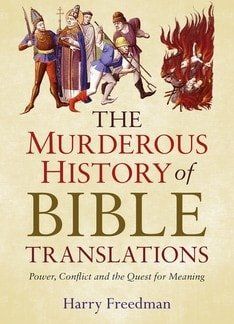This books comprises 13 chapters, subdivided into three parts: ‘Before the violence’, ‘The violence begins’ and ‘Enlightenment’. The book is broadly chronological, beginning with ‘The legacy of Alexandria’ and ‘The legend of the Septuagint’, while concluding with thoughts on ‘The future of the translated Bible’.
The author, Harry Freedman, is a writer and academic with a PhD in Aramaic. His publications include The Gospels’ veiled agenda and The Talmud: a biography. Readers should note that he does not write from an evangelical perspective. His description of inspiration will hardly instil confidence in conservative Christians: ‘Over the course of many centuries, individuals under varying degrees of inspiration wrote accounts of revelations, histories, prophesies and myths. The Bible is a collection of some of these accounts’ (p.2).
That said, this book is historiography and a good read. It offers no new discoveries, but provides a fairly comprehensive and compelling take on the chequered and controversial history of Bible translations, from the third century BC to the present day.
Freedman explores and explains the religious, social, political and personal milieus and motivations that prompted particular people to risk their livelihoods (and sometimes lives) to produce vernacular versions of Scripture. He concedes that the ‘history of Bible translations has not always been murderous, but it has rarely been lacking in contention’ (p.1). This he amply articulates.
Among other developments, the early chapters address the importance of the Targums and Pershitta and the significance of Edessa in the establishment and expansion of Christianity eastwards. Attention is drawn to Jerome and his considerable achievement in the production of the Latin Vulgate. The response of Christians and Jews alike to the challenge of Islam in the 7th century onwards is similarly covered.
The middle and lengthiest section of the book focuses on such themes as anti-Semitism and on the violent opposition of the late medieval church and state authorities to unorthodox groups like the Cathars in southern France, as well as more orthodox ones like the Lollards in England and Hussites in Bohemia.
A chapter is dedicated to the significance of William Tyndale, who paid for his labours with his life. The political and religious developments that led to the production and promotion of the King James Version are addressed, before crossing the Atlantic to North America.
The final section considers not only how the discovery of early scriptural manuscripts stimulated a fresh desire and demand for new translations, but also how contextualisation and cultural change has acted as a catalyst for controversial and corrupted paraphrases like the Queen James Bible.
Overall, a good summary and synthesis. Written for a general audience, this book will appeal to all with an interest in church history and Bible translation.
Wayne Pearce
Stornoway









